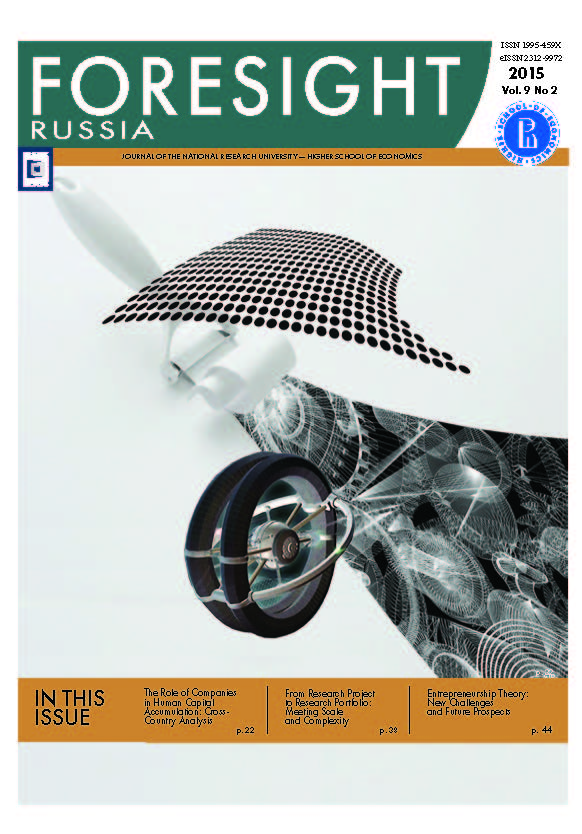Abstract
In this article, the mechanism of human capital accumulation is explored as an example of the participation of the economically active adult population in the main forms of lifelong learning. Demand for expanding lifelong activities is expressed by those employers who are concerned about the development of sustainable skills and upgrading the qualifications of their employees at companies. This process is driven by companies engaged in innovation activity. Russia has a high position in the world if the criterion for assessment is the level of formal education of employees, but Russian employees improve their professional knowledge and skills through lifelong learning less actively than employees in the EU. According to the results of the surveys, the gap between the rates of participation in lifelong learning of top and middle managers and the rates of participation of other employees is quite dramatic, and it demonstrates a failure in exchanging and transferring new knowledge and skills in Russian companies. In its turn, such a disproportionate state creates an obstacle for innovation activity in companies. In this article, we will discuss some state and corporate compensatory measures aimed at adjusting the extreme inequality in the education and training of employees. A higher return on investment in training can be achieved only by the harmonization of advanced knowledge of top and middle managers, who are most actively participating in lifelong learning, with a process of training other employees at companies. Middle managers are considered a key element, a sort of proponent of such a knowledge and skills exchange system, because they act as a mentors for workers.The paper’s core is comparative analysis of international surveys and a survey of Russian employers in six sectors of economy as a part of project “Monitoring of education markets and organizations,” which was initiated by the Russian Ministry of Education and Science and was conducted by National Research University HSE and Levada Center. In the paper we estimate the educational capital of top and middle managers and their rate of participation in lifelong training compared with the rate for employees occupying lower positions and evaluate Russian employers’ contribution to the provision of lifelong learning for employees in comparison with their colleagues from countries in the EU and OECD.
References
BIS (2012) National adult learner survey 2010. BIS research paper number 63. London: Department for Business, Innovation and Skills.
Bennis W., Bene K.D., Chin R. (1961) The planning of change. New York: Holt, Rinehart & Winston.
Blanden J., McNally S. (2015) Reducing inequality in education and skills: Implications for economic growth. EENEE Analytical report № 21. Brussels: European Commission.
Cedefop (2013) Piloting a European employer survey on skill needs illustrative findings. Research paper № 36. Luxembourg: Publications Office of the European Union.
De Broeck V. (2008) Small companies less likely to offer continuing vocational training. Dublin: European Foundation for the Improvement of Living and Working Conditions.
EBRD (2014) Business environment and enterprise performance survey 2012-2013 database. Режим доступа: http://ebrd-beeps.com/data/2012-2013/, дата обращения 17.02.2015.
European Commission (2004) Eurobarometer 62. Brussels: European Commission.
European Commission (2014) Education and training monitor 2014. Brussels: Directorate-General of Education and Culture.
Eurostat (2005) Statistics in focus. Lifelong learning in Europe (8/2005). Paris: Eurostat.
Eurostat (2010) Continuing Vocational Training Survey (CVTS). Режим доступа: http://ec.europa.eu/eurostat/cache/metadata/en/trng_cvts_esms.htm, дата обращения 15.03.2015.
Eurostat (2011) Adult Education Survey database. Режим доступа: http://ec.europa.eu/eurostat/cache/metadata/en/trng_aes_esms.htm, дата обращения 17.02.2015.
Eurostat (2015) EU Labour Force Survey results. Режим доступа: http://ec.europa.eu/eurostat/cache/metadata/en/tsdsc440_esmsip.htm, дата обращения 17.02.2015.
Gokhberg L., Poliakova V. (2014) Innovative Activities and Skills. The Global Innovation Index 2014. The Human Factor in Innovation, Geneva, Fontainebleau, Ithaca, NY: Cornell University, INSEAD, and WIPO, pp. 93-99.
Healy А., Smith M., Regeczi D., Binda Zane E., Klaassens E., Woodcraft P., Dodd J., Farrar P., Rademaekers K. (2011) Lags in the EU economy’s response to change. Rotterdam: ECORYS.
Janssens J. (2001) Innovations in Lifelong Learning: Capitalizing on ADAPT. Luxembourg: Office for Official Publications of the European Communities.
Kik G., Winterbotham M., Vivian D., Shury J., Davies B. (2014) Employer Skills Survey 2013: UK results. London: UK Commission for Employment and Skills.
Manpowergroup (2014) The talent shortage continues. How the ever changing role of HR can bridge the gap (talent shortage survey). Milwaukee, WI: Manpowergroup.
OECD (2014) Education at glance. Paris: OECD.
PEW Research (2013) Higher education, gender and work survey database. Режим доступа: http://www.pewsocialtrends.org/2014/12/22/higher-education-gender-work/, дата обращения 07.02.2015.
Verdonschot S. (2009) Learning to innovate. A series of studies to explore and earning in innovation practice. Twente: University of Twente.
West M., Patterson M., Dawson J., Nickell S. (1999) The effectiveness of top management groups in manufacturing organizations. London: London school of Economics and political science.
Гохберг Л.М. (ред.) (2012) Экономика знаний в терминах статистики: наука, технологии, инновации, образование, информационное общество. Словарь. М.: Экономика.
Коновалова В. (2008) Мировые тенденции обучения и развития персонала и ситуация в России // Кадровик. Кадровый менеджмент. № 9. Режим доступа: http://www.case-hr.com/statiyi-i-otcheti/35008.html, дата обращения 24.03.2015.
Красильникова М.Д., Бондаренко Н.В. (2014) Требования работодателей к текущим и перспективным профессиональным компетенциям персонала // Мониторинг экономики образования. Информационный бюллетень. №1 (75). М.: НИУ ВШЭ.
Красильникова М.Д., Бондаренко Н.В., Харламов К.А. (2005) Спрос на рабочую силу - мнение работодателей // Мониторинг экономики образования. Информационный бюллетень. №1 (19). М.: ГУ-ВШЭ.
НИУ ВШЭ (2013) Индикаторы образования: 2013. Стат. сб. М.: НИУ ВШЭ.
Трубин Г.А. (2011) Инновационная активность населения в дополнительном профессиональном образовании (социологическое исследование Тюменской области) // Профессиональное образование в России и за рубежом. Т. 2. № 4. С. 61-65.

This work is licensed under a Creative Commons Attribution 4.0 International License.

